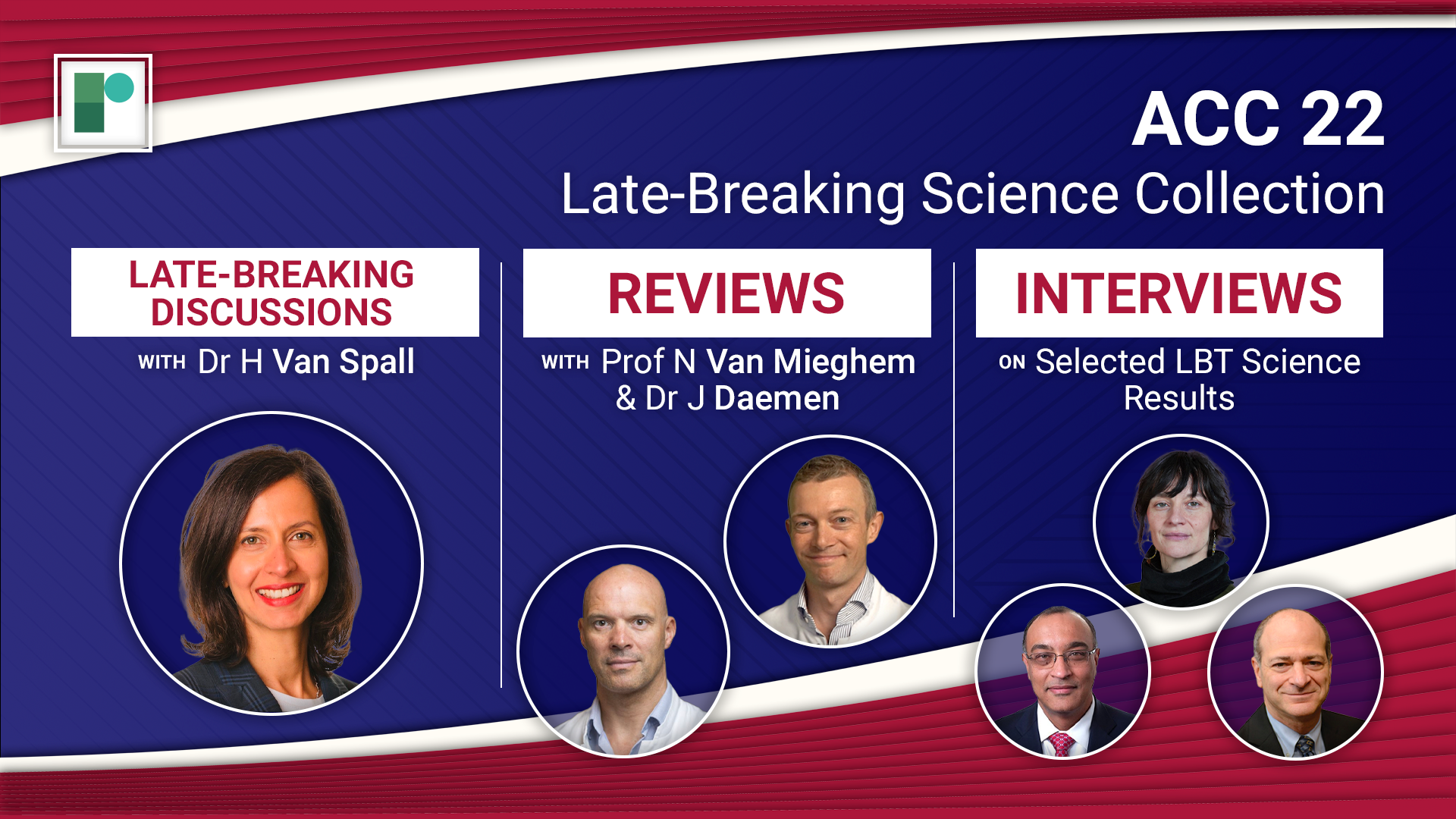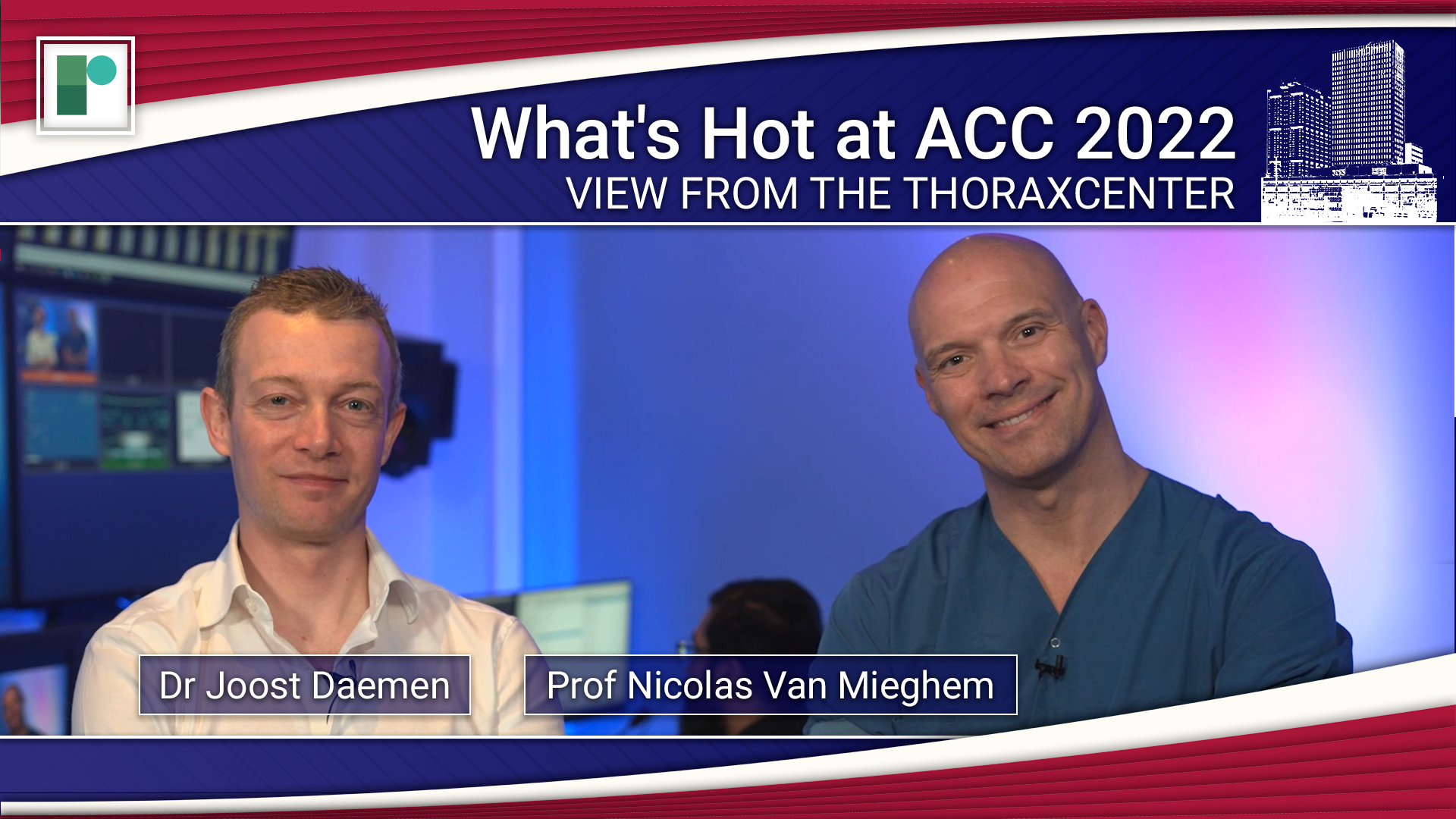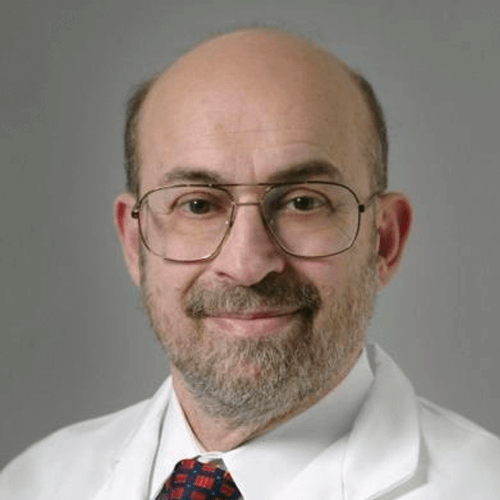ACC 2022: Late-breaking Science Video Collection
Published: 05 April 2022
-
Views:
 7613
7613
-
Likes:
 7
7
-
Views:
 7613
7613
-
Likes:
 7
7
-
 Up Next
Up Next -
 4m 48sPart 3 | Session 10 ACC 22: Results From a sub-study of the POISE-3 Trial
4m 48sPart 3 | Session 10 ACC 22: Results From a sub-study of the POISE-3 Trial -
 2m 55sPart 3 | Session 11 ACC 22: Findings from the CoreValve US Pivotal & SURTAVI Trials
2m 55sPart 3 | Session 11 ACC 22: Findings from the CoreValve US Pivotal & SURTAVI Trials -
 7m 44sPart 3 | Session 12 ACC 22: ADAPT-TAVR Shows SLT Does Not Affect CO for Patients After TAVR
7m 44sPart 3 | Session 12 ACC 22: ADAPT-TAVR Shows SLT Does Not Affect CO for Patients After TAVR -
 5m 41sPart 3 | Session 13 ACC 22: Results From the Chocolate-Touch Study
5m 41sPart 3 | Session 13 ACC 22: Results From the Chocolate-Touch Study -
 2m 25sPart 3 | Session 14 ACC 22: Results from the GIPS-IV Trial
2m 25sPart 3 | Session 14 ACC 22: Results from the GIPS-IV Trial -
 9m 27s
9m 27s -
 5m 35s
5m 35s -
 10m 24s
10m 24s -
 3m 50sPart 3 | Session 18 ACC 22: 3-year Efficacy Outcomes from the SPYRAL HTN-ON MED Med Pilot Study
3m 50sPart 3 | Session 18 ACC 22: 3-year Efficacy Outcomes from the SPYRAL HTN-ON MED Med Pilot Study -
 4mPart 3 | Session 19 2022 AHA/ACC/HFSA Guideline for HF Management: Highlights & Implementation
4mPart 3 | Session 19 2022 AHA/ACC/HFSA Guideline for HF Management: Highlights & Implementation
-
 12m 6sPart 4 | Session 1 ACC 22: 3 Trials That Will Change Your Practice with Dr Purvi Parwani
12m 6sPart 4 | Session 1 ACC 22: 3 Trials That Will Change Your Practice with Dr Purvi Parwani -
 6m 15s
6m 15s -
 7m 9sPart 4 | Session 3 4 Lipid Late-breaker Highlights from ACC.22 with Dr Erin Michos
7m 9sPart 4 | Session 3 4 Lipid Late-breaker Highlights from ACC.22 with Dr Erin Michos
-
 23m 9sPart 1 | Session 1 ACC 22 Late-breaking Science Preview Nicolas M Van Mieghem, Joost Daemen
23m 9sPart 1 | Session 1 ACC 22 Late-breaking Science Preview Nicolas M Van Mieghem, Joost Daemen
-
 28m 6sPart 1 | Session 2 ACC.22 Late-breaking Science Wrap-Up Nicolas M Van Mieghem, Joost Daemen
28m 6sPart 1 | Session 2 ACC.22 Late-breaking Science Wrap-Up Nicolas M Van Mieghem, Joost Daemen
-
 16m 42sPart 2 | Session 1 ACC 2022 Late-breaker Discussion: The SODIUM-HF Trial Justin Ezekowitz, Harriette Van Spall
16m 42sPart 2 | Session 1 ACC 2022 Late-breaker Discussion: The SODIUM-HF Trial Justin Ezekowitz, Harriette Van Spall
-
 16m 57sPart 2 | Session 2 ACC 2022 Late-breaker Discussion: The SuperWIN Trial Harriette Van Spall, Dylan L Steen
16m 57sPart 2 | Session 2 ACC 2022 Late-breaker Discussion: The SuperWIN Trial Harriette Van Spall, Dylan L Steen
-
 15m 38sPart 2 | Session 3 ACC 22 Late-breaker Discussion: The PROMPT-HF Trial Harriette Van Spall, Gregg C Fonarow, Tariq Ahmad
15m 38sPart 2 | Session 3 ACC 22 Late-breaker Discussion: The PROMPT-HF Trial Harriette Van Spall, Gregg C Fonarow, Tariq Ahmad
-
 22m 47sPart 2 | Session 4 ACC 22 Late-breaker Discussion: The DIAMOND Trial Harriette Van Spall, Javed Butler, Faiez Zannad
22m 47sPart 2 | Session 4 ACC 22 Late-breaker Discussion: The DIAMOND Trial Harriette Van Spall, Javed Butler, Faiez Zannad
-
 9m 38sPart 3 | Session 1 ACC 22: Findings from the VALOR-HCM Trial Milind Y Desai
9m 38sPart 3 | Session 1 ACC 22: Findings from the VALOR-HCM Trial Milind Y Desai
-
 7m 19sPart 3 | Session 2 ACC 22: MAVA-LTE Shows Improvement in NYHA Class in Patients Treated with Mavacamten Florian Rader
7m 19sPart 3 | Session 2 ACC 22: MAVA-LTE Shows Improvement in NYHA Class in Patients Treated with Mavacamten Florian Rader
-
 3m 19sPart 3 | Session 3 ACC 22: Results From the PACIFIC AF Trial Manesh R Patel
3m 19sPart 3 | Session 3 ACC 22: Results From the PACIFIC AF Trial Manesh R Patel
-
 3m 6sPart 3 | Session 4 ACC 22: FAME 3 Suggests CABG Outperforms FFR-Guided PCI in Patients with Multivessel Disease Frederik Zimmermann
3m 6sPart 3 | Session 4 ACC 22: FAME 3 Suggests CABG Outperforms FFR-Guided PCI in Patients with Multivessel Disease Frederik Zimmermann
-
 3m 54sPart 3 | Session 5 ACC 22: Results from the TRANSLATE-TIMI 70 Trial Brian Bergmark
3m 54sPart 3 | Session 5 ACC 22: Results from the TRANSLATE-TIMI 70 Trial Brian Bergmark
-
 4m 22sPart 3 | Session 6 ACC 22: Results from the POISE-3 Trial Philip J Devereaux
4m 22sPart 3 | Session 6 ACC 22: Results from the POISE-3 Trial Philip J Devereaux
-
 6m 30sPart 3 | Session 7 ACC 22: ICD Shock Therapies and the Burden of Ventricular Tachycardia Paolo Della Bella
6m 30sPart 3 | Session 7 ACC 22: ICD Shock Therapies and the Burden of Ventricular Tachycardia Paolo Della Bella
-
 6m 3sPart 3 | Session 8 ACC 22: PACMAN-AMI Shows Reduced Plaque Regression in AMI Patients Treated with Alirocumab Lorenz Räber
6m 3sPart 3 | Session 8 ACC 22: PACMAN-AMI Shows Reduced Plaque Regression in AMI Patients Treated with Alirocumab Lorenz Räber
Overview
Our regular review series View from the Thoraxcenter hosted by Prof Nicolas Van Mieghem and Dr Joost Daemen (Thoraxcentre, Erasmus MC, Rotterdam, NL) provide a concise analysis of the late-breaking science results and spotlight impactful data.
For a deeper dive into key clinical trial data, Dr Harriette Van Spall (McMaster University, Hamilton, CA)talks with principal investigators in her regular Late-Breaker Discussion Series.
Short, accessible Expert Interviews were conducted with select faculty focusing on the results, applicability, and impact on future research.
More from this programme
Part 1
View from the Thoraxcenter
Part 2
Late-breaker Discussion Series
Part 3
Expert Interviews
Faculty Biographies

Steven E Nissen
Cleveland Clinic, Cleveland, US
Dr. Steven E. Nissen, an esteemed American cardiologist, researcher, and patient advocate, has left an indelible mark in the field of cardiology. Formerly the chairman of cardiovascular medicine at the renowned Cleveland Clinic in Ohio, Dr. Nissen brings a wealth of experience and expertise to his roles.
Joining the Cleveland Clinic in 1992, Dr. Nissen held key positions, including Vice-Chairman of the Department of Cardiology, Section Head of Clinical Cardiology, and Director of the Coronary Intensive Care Unit. In his most recent role, he served as the Medical Director of the Cleveland Clinic Cardiovascular Coordinating Center (C5), overseeing multi-center clinical trials. Dr. Nissen continues to contribute periodically in the Cardiac Critical Care Unit, showcasing his ongoing commitment to patient care.
A highly accomplished academic, Dr. Nissen graduated from the Webb School of California before pursuing his undergraduate degree at the University of Michigan. He…
Transcript
Trial Rationale
So the Apollo Trial is designed to treat a lipid disorder that has been very resistant to treatment for a very long time and that's elevated Lipoprotein . About 20% of the world population have this lipid abnormality. And it is a cause for premature atherosclerotic cardiovascular disease and aortic stenosis. We really wanted to find treatments for it.
Mechanism of Action
What we studied is what's known as a short interfering RNA, it's a double stranded RNA and it's given subcutaneously. It is attached to a sugar that helps to transport it into the liver. It's taken up actively by the liver, is cleaved, and then one of the RNA strands degrades the messenger RNA that codes for the protein that's essential to the formation of lipoprotein.
Study Design and Inclusion Criteria
Well first of all this was a phase one trial so it's small. It was really designed primarily to look at safety but of course we do look carefully efficacy and we took people without known cardiovascular disease over the age of 18 men and women who had an elevated lipoprotein of at least 150 nanomoles per litre. And we ended up actually with the values even higher than that.
Key Findings
Well, first of all, key findings include we did not see any serious safety issues. The drug at the highest dose, we studied four different doses, at the highest dose it reduced lipoprotein by 98%. In the second to highest dose, it reduced it by 96%, but impressively, that effect was durable. And if you go on a 150 days, five months, was still 81% reduced in the top dose group and 70% reduced in the next highest dose group. So very effective lowering, very durable lowering.
Next Steps
So when you do these studies you have to plan the next phase, which is phase two. Right now we're doing what is known as a multiple dose study, where instead of giving a single dose, we give a couple of doses. We'll need to see what happens to the durability and to the efficacy when we give somewhat smaller doses but do it more than once. After that's completed we'll enter phase two and ultimately phase three.
Take-home Messages
This is part of the kind of routine approach to drug development. Take home message is that lipoprotein is important. It needs to be measured in more patients. There are therapies coming, the therapy we studied and at least two others. And ultimately this is that last frontier of a lipid disorder that we've never been able to treat and we're soon going to be able to treat.







